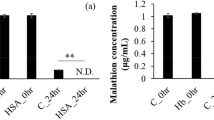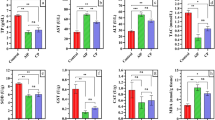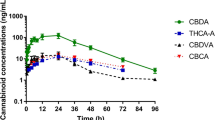Abstract
De Meillon1 reported that various arthropods are killed when fed upon rabbits which had received ‘Gammexane’ by ingestion. Similarly, Dr. S. G. Wilson, of the Veterinary Research Laboratories, Entebbe, Uganda, has found that the blood of cattle which had received benzene hexachloride by oral ingestion was toxic to tsetse flies for a considerable time after treatment2. Although biological tests thus showed that the insecticide was circulating in the blood, it seemed useful to apply the normal methods for the analysis of benzene hexachloride to estimation of the concentration in the blood of treated animals.
This is a preview of subscription content, access via your institution
Access options
Subscribe to this journal
Receive 51 print issues and online access
$199.00 per year
only $3.90 per issue
Buy this article
- Purchase on Springer Link
- Instant access to full article PDF
Prices may be subject to local taxes which are calculated during checkout
Similar content being viewed by others
References
De Meillon, Nature, 158, 839 (1946).
Wilson (in the press).
Neal, et al., U.S. Pub. Health Rep. Suppl. No 177 (1944).
Author information
Authors and Affiliations
Rights and permissions
About this article
Cite this article
BARLOW, F. Determination of Benzene Hexachloride in the Blood of Cattle. Nature 160, 719–720 (1947). https://doi.org/10.1038/160719b0
Issue Date:
DOI: https://doi.org/10.1038/160719b0
This article is cited by
-
Eigenschappen en Giftigheid Van Hexachloorcyclohexaan
Tijdschrift Over Plantenziekten (1950)
Comments
By submitting a comment you agree to abide by our Terms and Community Guidelines. If you find something abusive or that does not comply with our terms or guidelines please flag it as inappropriate.



